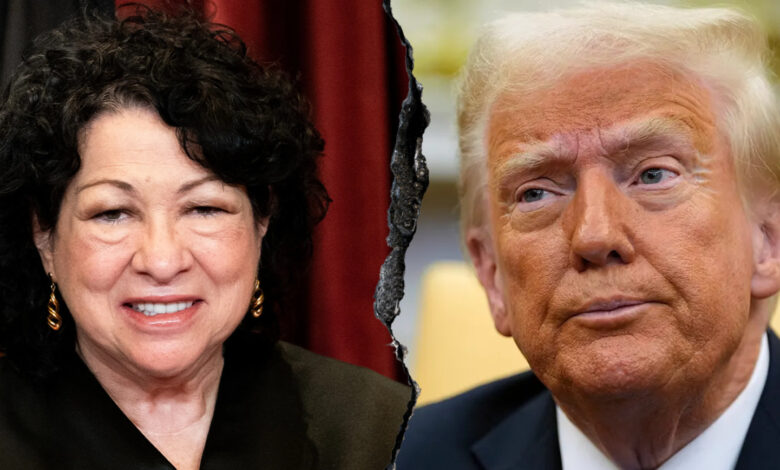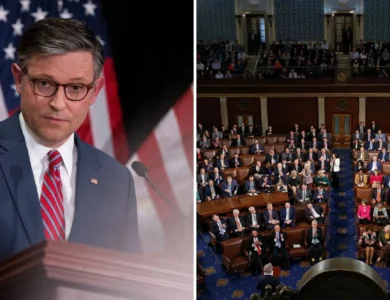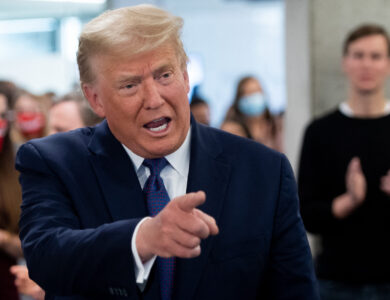Justice Sotomayor Urges Lawyers To ‘Stand Up’ Against Trump Admin

Liberal Supreme Court Justice Sonia Sotomayor urged attorneys to “stand up” against the Trump administration in remarks that are sure to draw plenty of criticism, especially from the political right.
Sotomayor made her remarks Thursday night at a meeting hosted by the left-wing American Bar Association, the nation’s biggest legal group. Appearing at the event was “an act of solidarity,” she told the organization, per NBC News.
“In all of the uncertainty that exists at this moment, this is our time to stand up and be heard,” she said. “Right now we can’t lose the battles we are facing.”
Read more: Hakeem Jeffries Makes The Most INSANE Comment Yet About Trump, Republicans
But Sotomayor also conveyed the current reality that the Trump administration presents to the legal profession.
“If you’re not used to fighting losing battles, don’t become a lawyer,” she said. “Our job is to stand for people who can’t do it themselves.”
“For me, being here with you is an act of solidarity,” she added, prompting enthusiastic applause from the audience of lawyers.
The high court’s three liberals have been vocal in recent months regarding criticism of SCOTUS by President Trump and members of his administration. However, as Georgetown University law school professor Jonathan Turley has pointed out for years, Trump is far from the only president from either major party to be critical of the high court and federal judges in general.
Read more: Dem Leaders Booker, Jeffries Pull Cringeworthy Stunt To ‘Connect’ With Americans
“In 2010, President Obama criticized the justices sitting in front of him at the State of the Union for their ruling in Citizens United v. Federal Election Commission,” Turley wrote in a USA Today column in February 2017, just a month into Trump’s first term.
“Of course, the most infamous attack of a president on the authority of the judiciary is attributed to Andrew Jackson. After [Chief Justice John] Marshall’s ruling against the right of Georgia to restrict the Cherokee in Worcester v. Georgia, New York Tribune editor Horace Greeley quoted Jackson as saying, ‘Marshall has made his decision, now let him enforce it,’” Turley noted further in the column.
He also noted that early Supreme Court justices were overtly political.
“The first chief justice, John Jay, ran for elected office twice while keeping his seat on the Supreme Court and left in 1795 to become the governor of New York. John Marshall openly opposed Andrew Jackson for the presidency. Charles Evans Hughes challenged Woodrow Wilson in 1916 and then returned to the court in 1930,” he wrote.
Read more: JUST IN: Supreme Court Hands Down Ruling In MS-13 Deportation Case – WOW
Continuing, he added:
Modern justices have largely (and wisely) set aside such ambitions, but our history is replete with bare-knuckled fights between presidents and their judicial antagonists.
For example, that paragon of U.S. democracy, Thomas Jefferson, and Chief Justice Marshall wholeheartedly disliked each other despite being third cousins once removed. Marshall expressed “almost insuperable objection” to Jefferson as “totally unfit for the chief magistracy of a nation which cannot indulge these prejudices without sustaining deep personal injury.” Jefferson referred to Marshall as a man of “lax lounging manners … and a profound hypocrisy.” Jefferson viewed Marshall as a Federalist hack, particularly after his decision on the right of Congress to charter the Bank of the United States in McCulloch v. Maryland.
Also, Trump has faced an unprecedented number of nationwide injunctions issued by U.S. district courts, many of which Turley said last month will most likely be overturned because the judges have overstepped their bounds. That includes Trump’s invoking of the Alien Enemies Act of 1798 to rapidly detain and deport members of foreign gangs he has designated as terrorist organizations.
“There are certainly strong arguments for the administration to make here,” Turley began. “I think that we have to be honest that there are good faith arguments on both sides. This is a controversial law being used in a new way and there are legitimate questions as to the meaning of some of these terms,” he said.
Read more: Federal Judge Who Blocked ICE Arrests May Have Conflict Of Interest: Report
“I also think the Trump administration is likely to prevail in most of these cases. I think that federal judges have overextended themselves,” he added.





